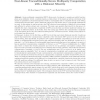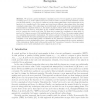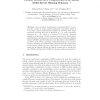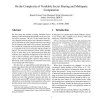13 search results - page 2 / 3 » Multiparty computation unconditionally secure against Q^2 ad... |
IACR
2011
12 years 4 months ago
2011
Secure multiparty computation (MPC) allows a set of n players to compute any public function, given as an arithmetic circuit, on private inputs, so that privacy of the inputs as we...
ASIACRYPT
2008
Springer
13 years 6 months ago
2008
Springer
Abstract. In secure computation among a set P of players one considers an adversary who can corrupt certain players. The three usually considered types of corruption are active, pa...
CRYPTO
2012
Springer
11 years 7 months ago
2012
Springer
We propose a general multiparty computation protocol secure against an active adversary corrupting up to n−1 of the n players. The protocol may be used to compute securely arithm...
ASIACRYPT
2005
Springer
13 years 10 months ago
2005
Springer
Abstract. As an extension of multi-party computation (MPC), we propose the concept of secure parallel multi-party computation which is to securely compute multi-functions against a...
STOC
2000
ACM
13 years 8 months ago
2000
ACM
We first study the problem of doing Verifiable Secret Sharing (VSS) information theoretically secure for a general access structure. We do it in the model where private channels b...




